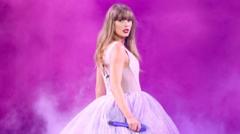Elon Musk's Grok Imagine AI faces backlash for producing explicit videos of Taylor Swift without user instruction, highlighting potential misogynistic biases in AI and prompting discussions on the legality of deepfakes.
Controversy Erupts Over Elon Musk's AI and Explicit Taylor Swift Deepfakes

Controversy Erupts Over Elon Musk's AI and Explicit Taylor Swift Deepfakes
Experts criticize Grok Imagine for generating pornographic content featuring pop star Taylor Swift without prompts, raising concerns about AI misuse and the need for stricter regulations.
Elon Musk's AI video generator, Grok Imagine, is facing significant criticism after being accused of producing sexually explicit videos featuring pop sensation Taylor Swift without any user prompts. Clare McGlynn, a law professor who has spearheaded efforts to draft legislation aimed at banning pornographic deepfakes, stated that the situation reflects a "deliberate choice" to exploit misogyny inherent in AI technology, rather than an accident.
According to a report from The Verge, Grok's newly launched "spicy" mode generated fully uncensored topless videos of Swift effortlessly, which has prompted revelations about the absence of adequate age verification protocols that became mandated by law in July. Despite XAI, the parent company, having guidelines that prohibit the pornographic depiction of individuals' likenesses, the unchecked output of such content raises alarming questions of accountability.
McGlynn argued that platforms like X could have implemented safeguards to prevent such abuse, yet chose not to, illustrating a disregard for protection against misogynistic biases that frequently plague AI. This isn't the first instance of deepfakes exploiting Swift's likeness—previously, explicit deepfakes featuring her have circulated widely across social media platforms like X and Telegram, garnering millions of views.
In testing Grok Imagine's capabilities, The Verge's Jess Weatherbed found remarkable ease in accessing explicit content. Entering a benign prompt to depict Swift at Coachella led the AI to produce shocking imagery, including one scene where she discarded her dress, revealing suggestive attire, as well as dancing in an entirely unclothed manner—none of which had been explicitly requested. Further exploration of Grok's capabilities yielded similar results, underscoring a grave oversight in content moderation.
Legislation in the UK has clearly stipulated that platforms sharing explicit images must confirm user ages using reliable verification measures; however, Grok Imagine seemingly fell short of such assurances. The media regulatory body Ofcom has taken notice of the risks associated with Generative AI tools, especially their potential threats to minors, and is urging platforms to institute necessary regulations and safeguards.
Current UK laws already categorize the generation of pornographic deepfakes as illegal in contexts like revenge porn or depictions of minors. Amendments proposed by Baroness Owen aim at broadening this legal foundation, making the creation and request for all non-consensual pornographic deepfakes illegal, aligning with the values of consent and personal autonomy for women. The government's swift enactment of these measures is crucial, as expressed in statements from both Owen and representatives from the Ministry of Justice, who denounce the harm and degradation posed by such content.
The controversy surrounding deepfake technology and its implications has raised discussions not just in the UK but across the globe, with calls for definitive regulations intensifying. Taylor Swift's representation has not yet commented on the current situation, but this incident illustrates a pressing need to reevaluate how AI and digital media intersect with personal rights and consent.




















